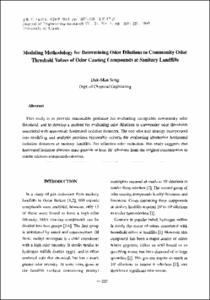가스터빈 블레이드 2차원 막냉각 특성에 대한 수치적 연구
- Alternative Title
- A Numerical Study of Two-Dimensional Film Cooling in a Gas Turbine Blade
- Abstract
- 고성능 개스터어빈 엔진의 냉각에 널리 채용되고 있는 막냉각 성능에 대한 체계적인 규명을 위하여 분사비, 분사각도, 하류형상의 변화에 따른 연구를 수행하였다. 정렬 격자를 이용하였으며, 분사비는 0.25-5.0, 분사각는 15˚-60˚(15˚씩 증가)에 대해 유동과 열전달 특성을 FLUENT를 이용하여 해석하였다. 물성치를 일정하게 가정한 경우와 온도의 함수로 가정한 경우를 비교하였다. 결과에 의하면, 분사각에 따라 냉각효율(벽면온도 900 K 까지의 도달거리)을 최대로 하는 분사비가 존재하였다. 하류형상을 5d(d는 슬롯 크기)만큼 상승 또는 하강 시키면 냉각효율이 떨어짐이 관측되었다. 일정물성치로 가정한 경우가 온도의 함수로 가정한 것에 비해 냉각성능이 과대평가됨을 알 수 있었다.
A numerical study has been performed for the 2-dimensional film cooling employed in the cooling of hot components such as gas trubines. The flow and heat transfer characteristics are numerically simulated using FLUNT software. Blowing ratios vary from 0.25 to 5.0 and coolant injection angles vary from 15˚ to 60˚in 15˚increment. The result shows that, for all cases, there exists a blowing ratio which maximizes film cooling effect (measured by the distance from the slot exit to the downstream wall location at which temperatre increases to 900 K) for a given injection angle. It is also observed that the film cooling effectiveness decreases when downstream wall is sunk or lifted. The simulation has been performed using both constant properties and temperature dependent variable properties. It is found that the case with constant properties overestimates the film cooling effect considerably.
A numerical study has been performed for the 2-dimensional film cooling employed in the cooling of hot components such as gas trubines. The flow and heat transfer characteristics are numerically simulated using FLUNT software. Blowing ratios vary from 0.25 to 5.0 and coolant injection angles vary from 15˚ to 60˚in 15˚increment. The result shows that, for all cases, there exists a blowing ratio which maximizes film cooling effect (measured by the distance from the slot exit to the downstream wall location at which temperatre increases to 900 K) for a given injection angle. It is also observed that the film cooling effectiveness decreases when downstream wall is sunk or lifted. The simulation has been performed using both constant properties and temperature dependent variable properties. It is found that the case with constant properties overestimates the film cooling effect considerably.
- Issued Date
- 2000
- Type
- Research Laboratory
- Alternative Author(s)
- Son,Chang Ho; Rho,Suk Man; Lee,Geun Sik
- Publisher
- 공학연구논문집
- Language
- kor
- Rights
- 울산대학교 저작물은 저작권에 의해 보호받습니다.
- Citation Volume
- 31
- Citation Number
- 1
- Citation Start Page
- 303
- Citation End Page
- 316
- Appears in Collections:
- Research Laboratory > Engineering Research
- 파일 목록
-
-
Download
 000002025438.pdf
기타 데이터 / 356.28 kB / Adobe PDF
000002025438.pdf
기타 데이터 / 356.28 kB / Adobe PDF
-
Items in Repository are protected by copyright, with all rights reserved, unless otherwise indicated.